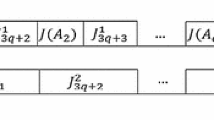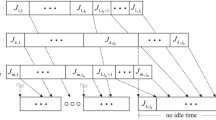Abstract
This paper analyses the total tardiness minimization in a flowshop with multiple processors at each stage. While there is considerable research to minimize the makespan, very little work is reported on minimizing the total tardiness for this problem. This research focuses on heuristic methods that consider this environment as a series of parallel machine problems. New dispatching rules are introduced. One of the proposed rules is able to deal with jobs that will come afterwards and not only the available jobs at the decision time. Dispatching rules are also associated with classical (forward and backward) and new list scheduling algorithms. A special scheduling algorithm able to deal with idle times is proposed. Computational experiments in a set of 4,320 literature instances show that the developed heuristics are competitive and outperforms their classical counterparts.
Similar content being viewed by others
References
Baker K.R., Bertrand J.W.M.: A dynamic priority rule for scheduling against due-dates. J. Oper. Manag. 3, 37–42 (1982)
Brah S.A.: A comparative analysis of due date based job sequencing rules in a flow shop with multiple processors. Prod. Plan. Control 7, 362–373 (1996)
Chu C., Portmann M.-C.: Some new efficient methods to solve the n/1/ri/∑Ti scheduling problem. Eur. J. Oper. Res. 58, 404–413 (1992)
Davis J.S., Kanet J.J.: Single machine scheduling with early and tardy completion costs. Naval Res. Logist. 40, 85–101 (1993)
Du J., Leung J.Y.T.: Minimizing total tardiness on one machine is NP-hard. Math. Oper. Res. 15, 483–495 (1990)
Guinet A., Solomon M.M., Kedia P.K., Dussauchoy A.: A computational study of heuristics for two-stage flexible flowshops. Int. J. Prod. Res. 34, 1399–1415 (1996)
Jin Z.H., Ohno K., Ito T.: Elmaghraby SE scheduling hybrid flowshops in printed circuit board assembly lines. Prod. Oper. Manag. 11, 216–230 (2002)
Kanet J.J., Li X.: A weighted modified due date rule for sequencing to minimize weighted tardiness. J. Schedul. 7, 261–276 (2004)
Karmarkar U.S., Nambimadom R.S.: Material allocation in MRP with tardiness penalties. J. Glob. Optim. 9, 453–482 (1996)
Kim Y.D.: A backward approach in list scheduling algorithms for multi-machine tardiness problems. Comput. Oper. Res. 22, 307–319 (1995)
Koulamas C.P.: The total tardiness problem: review and extensions. Oper. Res. 42, 1025–1041 (1994)
Lee G.C., Kim Y.D., Kim J.G., Choi S.H.: A dispatching rule-based approach to production scheduling in a printed circuit board manufacturing system. J. Oper. Res. Soc. 54, 1038–1049 (2003)
Lee G.C., Kim Y.D., Choi S.W.: Bottleneck-focused scheduling for a hybrid flowshop. Int. J. Prod. Res. 42, 165–181 (2004)
Linn R., Zhang W.: Hybrid flow shop scheduling: a survey. Comput. Ind. Eng. 37, 57–61 (1999)
Narain L., Bagga P.C.: Flowshop/no-idle scheduling to minimize total elapsed time. J. Glob. Optim. 33, 349–367 (2005)
Pardalos P.M., Resende M.: Handbook of Applied Optimization. Oxford University Press, Oxford (2002)
Potts C.N., Van Wassenhove L.N.: A decomposition algorithm for the single machine total tardiness problem. Oper. Res. Lett. 1, 177–181 (1982)
Quadt D., Kuhn H.: A taxonomy of flexible flow line scheduling procedures. Eur. J. Oper. Res. 178, 686–698 (2007)
Ribas I., Leisten R., Framinan J.M.: Review and classification of hybrid flow shop scheduling problems from a production systems and a solutions procedure perspective. Comput. Oper. Res. 37, 1439–1454 (2010)
Ronconi D.P.: A note on constructive heuristics for the flowshop problem with blocking. Int. J. Prod. Econ. 87, 39–48 (2004)
Ronconi D.P., Powell W.B.: Minimizing total tardiness in a stochastic single machine scheduling problem using approximate dynamic programming. J. Scheduling 13, 597–607 (2010)
Ruiz R., Vázquez-Rodríguez J.A.: The hybrid flow shop scheduling problem. Eur. J. Oper. Res. 205, 1–18 (2010)
Santos D.L., Hunsucker J.L., Deal D.E.: Global lower bound for flow shops with multiple processors. Eur. J. Oper. Res. 80, 112–120 (1995)
Sen T., Gupta S.K.: A state-of-art survey of static scheduling research involving due dates. OMEGA 12, 63–76 (1984)
Siegel S.: Nonparametric Statistics for the Behavioral Sciences. McGraw Hill, New York (1956)
Sridharan V., Zhou Z.: Dynamic non-preemptive single machine scheduling. Comput. Oper. Res. 23, 1183–1190 (1996)
Szwarc W., Mukhopadhyay S.K.: Earliness and tardiness single machine scheduling with proportional weights. J. Glob. Optim. 9, 227–238 (1996)
Author information
Authors and Affiliations
Corresponding author
Rights and permissions
About this article
Cite this article
Mainieri, G.B., Ronconi, D.P. New heuristics for total tardiness minimization in a flexible flowshop. Optim Lett 7, 665–684 (2013). https://doi.org/10.1007/s11590-012-0448-x
Received:
Accepted:
Published:
Issue Date:
DOI: https://doi.org/10.1007/s11590-012-0448-x




